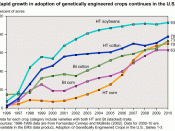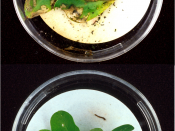Society is built on greed; people want everything to be fast, easy and beneficial. One way this is possible is through molecular genetics. Scientists have discovered that they can play God. They can add genes to organisms to make them better benefit people's demands. For the past 20 years or so, scientists have been genetically modifying plants and more recently they have started on animals. (Martin, Andrew. "Will FDA bite..."). A lot of fruits and vegetables have been altered by adding genes that will keep them fresher, make them bigger, grow faster, etc. So now scientists have been trying this with animals, more specifically with salmon.
Salmon is ranked third among most popular seafood in the United States, trailing behind shrimp and canned tuna. (Martin, Andrew. "Will FDA bite..."). That's why companies such as 'Aqua Bounty Farms' and 'New Zealand King Salmon Limited' have been genetically engineering salmon to grow faster than native ones.
They have added an anti freeze gene, which fish in colder waters carry, so that the salmon can be grown in colder climates. They have added genes from species such as the ocean pout that creates higher growth in the pituitary gland and the liver. (Fishmonger News Network. "Aqua Bounty Farms..."). But there are many risks involved in genetically modifying salmon. If any of the fish, their sperm or their eggs escaped from the growing compound, it could affect the natural fish and their environments. The waste produced by experimenting on the salmon or if some die, there needs to be a proper site to dispose of it. (ERMA New Zealand. "Decision on GM...").
Another obstacle is consumers. If the companies obtain the rights to sell their GM salmon, prices would become much lower for the fish, since production costs will also lower. Many more...


